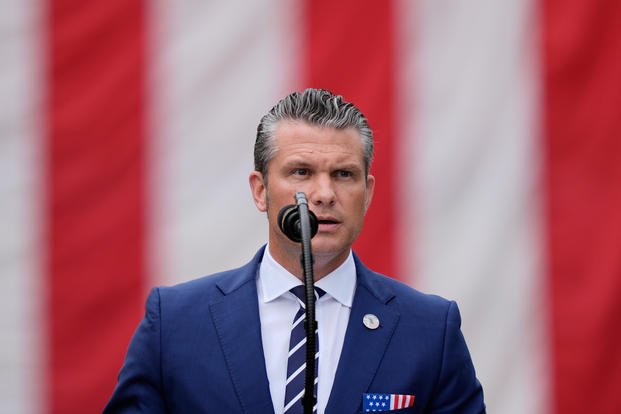WASHINGTON — Defense Secretary Pete Hegseth has announced that he has decided that the 20 soldiers who received the Medal of Honor for their actions in 1890 at Wounded Knee will keep their awards in a video posted to social media Thursday evening.
Hegseth’s predecessor, Lloyd Austin, ordered the review of the awards in 2024 after a Congressional recommendation in the 2022 defense bill — itself a reflection of efforts by some lawmakers to rescind the awards for those who participated in the bloody massacre on South Dakota’s Pine Ridge Indian Reservation near Wounded Knee Creek.
While the events of that day are sometimes described as a battle, historical records show that the U.S. Army, which was in the midst of amid a campaign to repress the tribes in the area, killed an estimated 250 Native Americans, including women and children, of the Lakota Sioux tribe, while attempting to disarm Native American fighters who had already surrendered at their camp.
“We’re making it clear that (the soldiers) deserve those medals,” Hegseth said in the video, before adding that “their place in our nation’s history is no longer up for debate.”
After the fighting, Medals of Honor were given to 20 soldiers from the 7th Cavalry Regiment, and their awards cite a range of actions including bravery, efforts to rescue fellow troops and actions to “dislodge Sioux Indians” who were concealed in a ravine.
The event also became a celebrated part of the regiment’s history, with their coat of arms still featuring the head of a Native American chief to “commemorate Indian campaigns,” according to the military’s Institute of Heraldry.
In 1990, Congress apologized to the descendants of those killed at Wounded Knee but did not revoke the medals.
According to Hegseth, the review panel ordered by Austin “concluded that these brave soldiers should, in fact, rightfully keep their medals from actions,” but an official from the defense secretary’s office couldn’t say if the report he was referencing in the video would be made public.
President Donald Trump issued an executive order in March titled “Restoring Truth and Sanity to American History” that decried efforts to reinterpret American history and, since then, Hegseth has undertaken multiple actions that have subverted the recommendations of a Congressionally-mandated commission that examined the use of Confederate names and references in the military.
He reverted the names of several Army bases back to their original, Confederate-linked names, though by honoring different figures.
Hegseth also restored a 1914 memorial to the Confederacy that was removed from Arlington National Cemetery. The monument features a classical female figure, crowned with olive leaves, representing the American South, alongside sanitized depictions of slavery.
In September, the US Military Academy at West Point, New York, also confirmed that a painting of Gen. Robert E. Lee dressed in his Confederate uniform was back on display in the school’s library after being removed in 2022. The portrait shows a Black man leading Lee’s horse in the background, which had been hanging in the library since the 1950s before it was placed in storage.
Story Continues
© Copyright 2025 Associated Press. All rights reserved. This material may not be published, broadcast, rewritten or redistributed.
Read the full article here


14 Comments
The Wounded Knee massacre remains one of the most tragic events in U.S. history. Honoring soldiers who participated in it is a sensitive topic—should their bravery overshadow the broader context?
While some may argue for rescinding the medals, it seems the current administration prefers to keep them intact. What do you think about this approach to historical recognition?
Some will see this as a final verdict, while others may still seek further account of the events. What do you think—has justice been served, or is there more to discuss?
The medals are a symbol of valor in war, but the story of Wounded Knee is complex. Should we interpret this as a step toward honoring all who were involved, or is it a missed opportunity for deeper reconciliation?
Hegseth’s statement clearly sides with those who believe the medals should remain. It’s a controversial stance, given the massacre’s dark legacy. Do you think the honors do justice to the soldiers’ actions?
Should medals awarded under such controversial circumstances remain? It’s a question that balances honor with historical truth. What’s your perspective?
Medals of Honor are meant to celebrate extraordinary courage, but in cases like Wounded Knee, the ethics of awarding them come into question. What’s your take on this tricky issue?
This decision has sparked some debate. While respecting the awards, it’s important to acknowledge the historical context of Wounded Knee. The human cost of such conflicts should never be overlooked.
Those involved in the Wounded Knee massacre were justified in their actions because the Lakota Sioux had surrendered. However, others may argue that the medals should be rescinded due to the one-sided nature of the conflict. Still, the decision has been made.
Revisiting historical awards for dark moments like Wounded Knee is always challenging. This decision, regardless of stance, will certainly be a topic for historians and activists alike.
Hegseth’s decision is firm, and he’s made it known that the soldiers’ place in history isn’t up for debate. Whether we agree or not, this marks a clear stance from the Defense Department.
Hegseth’s statement leaves little room for debate, but the conversation about Wounded Knee’s legacy continues. Should we focus more on the soldiers or the broader impact on Native American communities?
The decision to keep the medals isn’t just about the soldiers—it’s about how we remember history. Does this move reflect respect for their service or overlook the tragedy they were part of?
This is a complex issue with strong opinions on both sides. Hegseth’s stance may put an end to the debate, but history will always remember Wounded Knee as a tragedy.